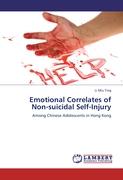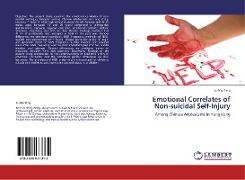Emotional Correlates of Non-suicidal Self-Injury
BücherAngebote / Angebote:
Objective: The present study examines the emotional correlates of non-suicidal self-injury behavior among Chinese adolescents in Hong Kong. Method: A total of 5423 high school students (52.8% females and 47.2% males, aged between 12 and 20 years) completed a selfreported questionnaire assessing negative emotions, emotional reactivity, distress tolerance, impulsivity, and NSSI in class. Results: Findings revealed that 31.1% of participants had engaged in NSSI in the past year. Gender differences on emotional correlates, NSSI frequency, methods of NSSI, suicidal ideation/attempt were found. Unique predictive ability of anger and dysphoric mood on NSSI frequency, suicidal ideation and attempt were small. NSSI frequency was the most important predictor for suicidal ideation and attempt. Gender differences on predictive power of emotional variables were also observed. Discussions: Findings of the present study contributed to the understandings of predictive ability of emotional correlates, and the associated gender differences on NSSI behaviors. The prevalence of NSSI is alarming, it is important for clinicians, schools and families to pay more attention and support to children.
Folgt in ca. 10 Arbeitstagen





